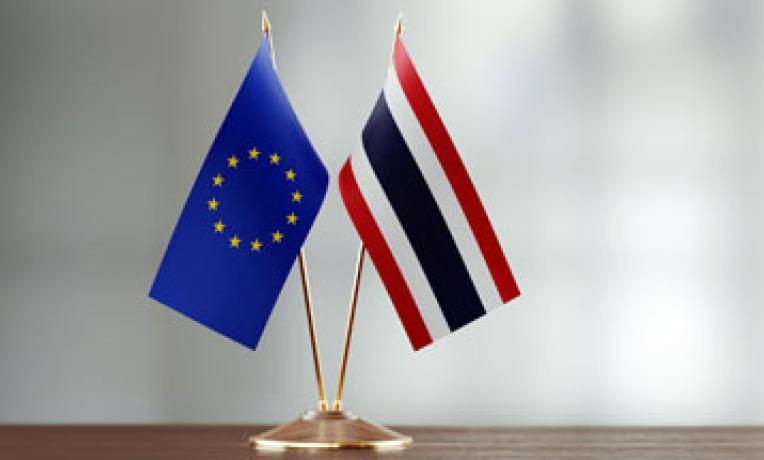EU and Thailand signs partnership for collaboration in frontier research

A new initiative between the European Union and Thailand was launched today to encourage collaboration between leading Thai researchers and European Research Council (ERC) grantees and their teams. This joint scheme is the first of its kind targeting researchers in Thailand. It will promote cooperation between the Thai Programme Management Unit for Human Resources & Institutional Development, Research and Innovation (PMU-B) of the National Higher Education, Science, Research & Innovation Policy Council and the ERC.
H.E. the European Union Ambassador to Thailand, David Daly, and the Director of PMU-B Prof. Dr. Sompong Klaynongsruang signed the new initiative today at a ceremony in Bangkok.
European Commissioner for Innovation, Research, Culture, Education and Youth Mariya Gabriel said: “With the signing of this new initiative, a positive step has been taken to strengthen collaboration between the EU and the ASEAN region in scientific research. It will benefit both sides, with top Thai researchers joining teams led by outstanding scientists funded by the European Research Council.”
ERC President Prof. Maria Leptin, who attended the ceremony remotely, said: “We welcome this new agreement that is fully in line with the ERC’s openness to the world. Excellent science is intrinsically international; encouraging scientific exchange across continents can only benefit us all. This initiative will help ERC grantees to host top talent from Thailand and will facilitate interactions of Thai researchers with international partners. It’s a win-win.”
Prof. Dr. Sompong Klaynongsruang, PMU-B Director, stated: “The European Research Council is internationally recognised as one of the most successful frontier science programmes in the world. We are delighted for the bright young Thai researchers to gain world-class experience working alongside the ERC-funded research teams. We sincerely appreciate the European Commission’s and the ERC’s support and are confident that this initiative will lead to a long-term impactful collaboration between Thailand and the EU in frontier research.”
The scheme, formally called administrative arrangement (formerly “implementing arrangement), is open to top researchers supported by PMU-B. It will facilitate their temporary participation in ERC research groups in similar areas of research or on topics of mutual interest. Such single or multiple research visits can be short or long-term. This arrangement forms part of the ERC’s global outreach strategy that aims to make Europe a hub for research talent.
Background
The European Research Council, set up by the European Union in 2007 and marking its 15th anniversary this year, is the premier European funding organisation for excellent frontier research. It funds creative researchers of any nationality and age, to run projects based across Europe. The ERC offers four core grant schemes: Starting Grants, Consolidator Grants, Advanced Grants and Synergy Grants. With its additional Proof of Concept Grant scheme, the ERC helps grantees to bridge the gap between their pioneering research and early phases of its commercialisation.
To date, the ERC has funded over 11,000 top researchers at various stages of their careers, and over 80,000 postdoctoral fellows, PhD students and other staff working in their research teams. With grants open to talent of any nationality, the ERC aims to attract top researchers from across the world. So far, two Thai nationals have won ERC funding. The ERC also encourages non-European scientists to join ERC-funded teams. Around 17% of team members are non-European nationals.
After the first initiative in 2012 to encourage talent backed by the US National Science Foundation, NSF, to join temporarily ERC teams, other Implementing Arrangements followed with prestigious funding bodies across different continents.
The ERC is led by an independent governing body, the Scientific Council. Since 1 November 2021, Maria Leptin is the President of the ERC. The overall ERC budget from 2021 to 2027 is more than €16 billion, as part of the Horizon Europe programme, under the responsibility of the European Commissioner for Innovation, Research, Culture, Education and Youth, Mariya Gabriel.
ERC and non-European researchers
EU international R&I cooperation





